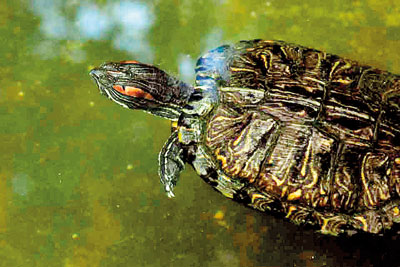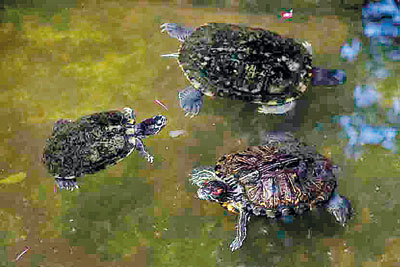News
Abandoned exotic pets endanger native animals
View(s):By Kasun Warakapitiya
The small and colourful exotic turtles sold in aquariums invade natural waterways posing a threat to endemic fishes when released into the wild after pet owners fail to care for them, a senior wildlife official said.
The official said that non-native species compete for the same resources and could even prey on native species.
However, exotic turtles and tortoises are available in aquarium shops and even advertised on social media. There are many colour variants and different species available in the market. They sell for Rs 5,000, to Rs 25,000 to Rs 150,000 according to variety, genetic traits such as (albinism and leucism) as well as availability, a pet shop owner said.

Most sellers of exotic turtles showcase them in the back corner of their aquariums. They exhibit three to four inch emerald green tiny red eared slider turtles (Trachemys scripta elegans) in small tanks with a trickle of water and a rock for them to bask on.
The Sunday Times made these observations at an aquarium on Hendala Road, Wattala that over 25 to 30 turtles are cramped into a tank. Some looked lethargic and sick.

Red-eared Sliders Pix by Akila Jayawardena
Some pet shop owners even give wrong information. They tell customers that these turtles do not grow large and can be trained to eat fish pellets.
However, an unfortunate pet owner who declined to be named, is trying to rehome his pet turtle and said it grew larger than expected in a few years and started feeding on his aquarium fishes. He added that the aquarium which sold the animal did not accept it.
A pet shop owner in Colombo who sells turtles said they have to be responsible and provide correct information and also accept animals if the owners can’t handle them.
He claimed that those in the industry who are not responsible might attack him and the Government authorities might cancel his import permits for turtles for divulging information.
“Some species such as red eared sliders are invasive and become quite large and are omnivores, while turtles such as alligator snapping turtles (Macrochelys temminckii) are carnivorous and are considered the largest freshwater species in north America and also considered invasive,” he added.
The alligator snapping turtle is also listed as a threatened species listed as a CITES Appendix II species. International trade is regulated by CITES permits according to the CITES convention.
He sells an albino red eared slider turtle for Rs 25,000 and even said that he could also import an alligator snapping turtle for Rs 150,000. The pet owner said that the prices are kept high to only allow purchases by those who have the capacity to collect rare exotic animals.
Environmentalists complained that most exotic animals are smuggled in.
Environmentalist and the founder of the Customs’ Biodiversity Protection Unit Samantha Gunasekara said that the unregulated exotic pet trade has allowed many invasive species of turtles and tortoises into the country.
He said that the customs does not have a facility to keep seized animals. The zoo is reluctant to accept smuggled animals.
Turtles such as red eared sliders and green eared sliders are considered as highly invasive species. Alligator snapping turtles are also found in aquariums for sale. Most aquariums do not have permits. Animals are smuggled in by air cargo and passenger cargo.
Mr Gunasekara alleged that he suspects that smugglers could be bribing officials at animal quarantine at airports and getting the permits, and the customs officials who are negligent and untrained would be clearing the animals as animal quarantine had permitted the animals.
Animal Quarantine claims that the invasive species were entering the country due to failure of Customs to make detections, but Customs officials counter-claimed that because of the licensing system by Animal Quarantine, invasive species are entering the country.
A senior official of animal quarantine who declined to be named, denied the allegations of bribery. She said they ensure animals do not harbour dangerous diseases and check if animals had undergone 30-day quarantine periods at the country of origin and whether the animal is harmful to native species.
She added that most animals come undetected. The animals which come through air cargo are concealed in luggage and evade customs.
Seevali Arukgoda, customs’ spokesman as well as deputy director general, said that animal quarantine comes under the Department of Animal Production and Heath and it is the licensing authority for imports.
Thilak Premakantha, Director General of the National Zoological Gardens said that they have always accepted animals confiscated by customs provided there is a court order.
He said zoos have space limitations and specific health conditions to meet when keeping exotic animals and do not take in unwanted exotic pets.
The Director General of the Department of Wildlife Conservation, Chandana Sooriyabandara told the Sunday Times that it is illegal to release exotic animals into the natural environment.
He added that they can take legal actions against people who engage in such activity.
He added that CITES permits have to be obtained for imports and he is sceptical that aquariums obtain such documents.
The best way to say that you found the home of your dreams is by finding it on Hitad.lk. We have listings for apartments for sale or rent in Sri Lanka, no matter what locale you're looking for! Whether you live in Colombo, Galle, Kandy, Matara, Jaffna and more - we've got them all!

